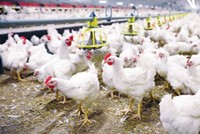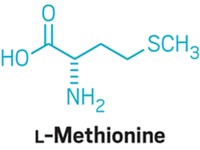Advertisement
Grab your lab coat. Let's get started
Welcome!
Welcome!
Create an account below to get 6 C&EN articles per month, receive newsletters and more - all free.
It seems this is your first time logging in online. Please enter the following information to continue.
As an ACS member you automatically get access to this site. All we need is few more details to create your reading experience.
Not you? Sign in with a different account.
Not you? Sign in with a different account.
ERROR 1
ERROR 1
ERROR 2
ERROR 2
ERROR 2
ERROR 2
ERROR 2
Password and Confirm password must match.
If you have an ACS member number, please enter it here so we can link this account to your membership. (optional)
ERROR 2
ACS values your privacy. By submitting your information, you are gaining access to C&EN and subscribing to our weekly newsletter. We use the information you provide to make your reading experience better, and we will never sell your data to third party members.
Business
Evonik Slates Lysine In Russia
Agriculture: German firm makes another investment in amino acids for animal feed
by Michael McCoy
October 9, 2011

Evonik Industries has established a joint venture with the Russian firm RusBiotech International that plans to build a plant in Russia for the animal feed additive L-lysine. The facility is expected to open in 2014 in Volgodonsk at a cost of about $200 million.
Evonik, based in Essen, Germany, is a minority partner in the joint venture, although the company says it has an option to increase its share “significantly.” The project has the backing of the governor of the Rostov region where the plant will be built, Evonik says.
Evonik and RusBiotech say they are also in talks with the state-owned Russian Corporation of Nanotechnologies about its possible acquisition of a stake in the joint venture. Rusnano is increasing its ties with Western firms, having recently invested in a joint venture with U.S.-based Cleveland BioLabs and with the U.K.’s Pro Bono Bio.
The lysine venture is the latest of several moves made by Evonik recently to increase its presence in the amino acid market. Notably, the firm is doubling lysine capacity at its plant in Blair, Neb., and has announced plans to build a new DL-methionine plant in Singapore at a cost of $500 million.
Evonik claims to be the only company in the world to produce all four essential amino acids used in animal nutrition: lysine, methionine, L-threonine, and L-tryptophan. Methionine is produced synthetically whereas the other three are made via fermentation. The planned Russian facility will be based on about 300,000 metric tons per year of wheat grown in the Rostov region.
“Russia is an important market for us, a country in which demand for biotechnology-manufactured amino acids is growing,” says Patrik Wohlhauser, the board member responsible for Evonik’s consumer, health, and nutrition business. He expects the combination of a partner with local experience and an international firm with leading technology will bring success in the country.





Join the conversation
Contact the reporter
Submit a Letter to the Editor for publication
Engage with us on Twitter